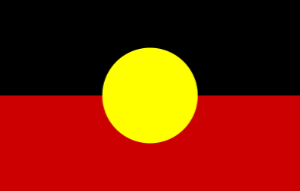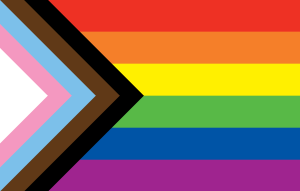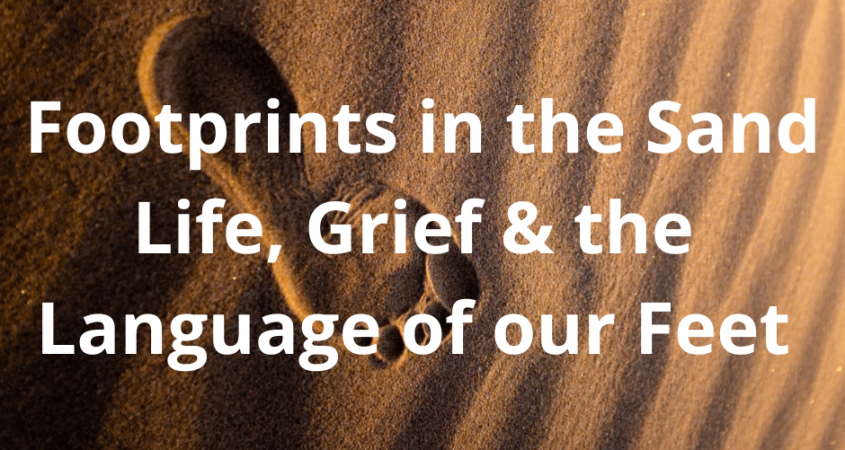Footprints in the Sand – Life, Grief & the Language of our Feet
Newly bereaved, most of us have difficulty putting one foot after the other and if we walk behind the coffin of someone we love, we probably look as if we have lead in our shoes, our footsteps slow and measured. Children often tell their counsellors that they feel grief in their feet, and boys in particular tend to cry on the inside while kicking a football.
Grief aside for a moment, the words foot, footprints and feet seem to have become a familiar and concerning aspect of our daily news feeds. We fear the spread of foot and mouth disease, a current problem, because of its debilitating effect on animals, and its financial impact on individual farmers and on the national and global economy. We’re regularly admonished for our insensitivity to the environment and our large carbon footprints that appear to be contributing to rapid climate change.
Realistically, it’s our hands that do most of the damage – from the rubbish we scatter on land, sea and air, the destruction of fauna and flora, to our violent behavior to each other. Hands also do caring and creative things which I’ve talked about in other blogs, and I’ve used their symbolism in teaching and therapy sessions, especially with children, but have never done so with feet. Why not? What is it about feet I wonder?
If we’re lucky enough to have feet, most of us are likely to take them for granted, unless of course they protest our neglect by sending signals of pain and distress that demand attention.
Feet play such an important role in our daily lives that I decided to explore my attitude about feet and those of other people in a little more depth. In relationships, in family, or other group settings, when the idea of reciprocal foot massages is suggested, many people say a version of ‘I don’t like feet’, an expression of disgust on their face as they speak.
Our poor, unappreciated feet, so necessary for independent mobility, for playing sport, for dancing, and for lugging our considerable weight from pillar to post from sun-up to sundown. What meaning do we give to feet in our daily lives, in literature, art, religion and health care?
Let’s Start at the Beginning
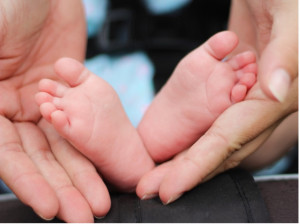 We attach meaning to feet almost from the moment a baby draws breath. Babies’ footprints, more developed than handprints, are taken in hospital soon after birth and attached to medical records as a form of identification. We may keep our baby’s footprints for sentimental reasons, and, if our baby dies early in life, we may choose to frame their footprints or add them to memory boxes as a way of honoring their existence and the indelible footprints they leave on our hearts.
We attach meaning to feet almost from the moment a baby draws breath. Babies’ footprints, more developed than handprints, are taken in hospital soon after birth and attached to medical records as a form of identification. We may keep our baby’s footprints for sentimental reasons, and, if our baby dies early in life, we may choose to frame their footprints or add them to memory boxes as a way of honoring their existence and the indelible footprints they leave on our hearts.
Babies’ unscarred feet entice many adults to touch, tickle, or kiss them, and babies often find their own feet fun to play with. As we live our lives our feet change shape, develop scars, and somehow become less appealing, not only to others, but to ourselves.
I think of people who have been without feet from birth, and those who have lost them as a result of injury or illness, imagining that they might give anything to have feet to carry them around, no matter how scarred or unattractive they might be.
Religion, Art and Literature
In religion, it can be a sign of respect or purity to remove shoes and go barefoot when entering a religions site, symbolizing ‘baring one’s soul’. It’s a Jewish custom, and a custom in some Christian denominations, to go barefoot when in mourning, or to signify great distress or calamity. Most of us are familiar with the custom of washing the feet of another to signify humility.
Feet in art and literature have also been used to symbolise poverty, modest living, purity, freedom, dying, sexuality and a solid foundation. Being connected to the earth.
Child Rearing Practices
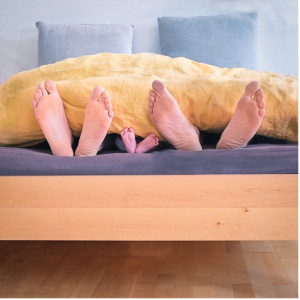 Some of our first instructions around feet are about what not to do with them. For example, don’t put your feet on the furniture, don’t come into the house with dirty feet, stop kicking the back of the seat (car, plane…) and so on.
Some of our first instructions around feet are about what not to do with them. For example, don’t put your feet on the furniture, don’t come into the house with dirty feet, stop kicking the back of the seat (car, plane…) and so on.
Many of us may have memories of being told by parents, teachers and other adults to stand on our own two feet, put our best foot forward, to stop dragging our feet, or to follow (or not) in another person’s footsteps. We may wonder what is meant by ‘our best foot’, especially when we’re very young, never really grasping its meaning. In literature, the psychological meaning appears to be that our right foot symbolizes our public face, and the left our private, inner thoughts and feelings, our spiritual self. Perhaps being told to put our best foot forwards is another way of saying ‘keep a stiff upper lip and never show your vulnerabilities in public.’ When we talk about someone having two left feet, do we mean that they are clumsy, or that they share too much?
At the end of a long and tiring day we might complain to colleagues, partners, or children that we’ve been run off our feet, hoping that some sensitive soul might care enough to insist that we put our feet up as they offer a massage.
Bad language might result in any of us being told that ‘if X heard you speak like that you’d make their toes curl.’ Hesitant, shy children might be encouraged to ‘jump in with both feet’ when confronted with something new, while many of us vote with our feet in shopping centers and other venues.
Everyday Comments and Conversations
 There are innumerable sayings related to feet that we use in everyday language to describe, give advice, criticize, or praise. We tend to admire people who can think on their feet, who minimize their carbon footprints, jump in with both feet to carry out tasks, who know how to put their foot down, when necessary, who stand on their own two feet, who foot the bill, and who treat others as if they are on an equal footing.
There are innumerable sayings related to feet that we use in everyday language to describe, give advice, criticize, or praise. We tend to admire people who can think on their feet, who minimize their carbon footprints, jump in with both feet to carry out tasks, who know how to put their foot down, when necessary, who stand on their own two feet, who foot the bill, and who treat others as if they are on an equal footing.
Socially, we (unfortunately) often search for weaknesses in public figures until we find their feet of clay, criticize them when they pussyfoot around, avoiding answering direct questions or making decisions. If they are senior citizens, we may critically declare that they have one foot in the grave and shouldn’t hold responsible positions. Think too of the enjoyment many experience when they spot someone shooting themselves in the foot.
Feet, Health and Palliative Care
 Our feet ache for many reasons. For example, an occupation that means standing all day, or wearing the wrong shoes. Care of our feet is important throughout life and especially so as we age, or when we have illnesses such as diabetes. According to reflexologists, many health conditions can be diagnosed and treated through our feet and a foot massage by a trained and competent practitioner can bring almost instant relief from pain.
Our feet ache for many reasons. For example, an occupation that means standing all day, or wearing the wrong shoes. Care of our feet is important throughout life and especially so as we age, or when we have illnesses such as diabetes. According to reflexologists, many health conditions can be diagnosed and treated through our feet and a foot massage by a trained and competent practitioner can bring almost instant relief from pain.
When someone we love is living with a chronic illness or struggling with pain at the end of their life, most of us feel helpless to relieve their suffering. One of the things any of us (from young children to adults) might offer is a foot massage, a way of soothing pain, loneliness or distress, and our own helplessness. In this way we can retain connectedness even when words are no longer possible.
Foot in Mouth – Words that hurt Grieving Children
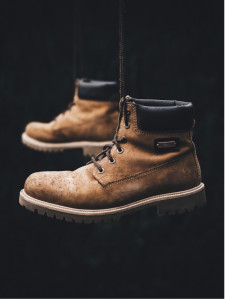 Sensitive and compassionate folk are usually appropriately concerned about saying the wrong thing to children and adults who are newly bereaved. All we can really say is a version of ‘I wish I could do or say something that could make you hurt less, but I know that isn’t possible. I want you to know that I care and what I can do is…’
Sensitive and compassionate folk are usually appropriately concerned about saying the wrong thing to children and adults who are newly bereaved. All we can really say is a version of ‘I wish I could do or say something that could make you hurt less, but I know that isn’t possible. I want you to know that I care and what I can do is…’
When we put our foot in our mouth as the saying goes, we are likely to be giving unasked for advice, telling people how they should feel or behave, and how they should grieve.
If a family member dies from suicide, surviving children may be watched like hawks for perceived or imagined suicidal tendencies and admonished with the words ‘don’t you go following in your father/mother/brother/sister’s footsteps.’
If a popular parent or sibling dies, no matter what the cause of death, a child may be told ‘you have big shoes to fill’, or perhaps ‘I hope you follow in your father’s or mother’s footsteps. They set a really good example for you.’ Another piece of advice might be ‘You’re the man of the house now. You need to stand on your own two feet and not make too much work for your mother.’ A young daughter may be encouraged to fill her mother’s shoes with the words ‘You’re the mother of the house now. You need to look after your little sister and brother.’
Easy words to say, but we may place a burden of responsibility on the shoulders of a child who is heartbroken, feeling regressed and vulnerable and needing compassionate understanding. When the time is right, it might be more helpful for us to find out how the child wants to live their life, what qualities of the person who died are ones they also have, or would like to have, and what is unique and special about themselves. What footprints would they like to leave behind?
Footprints in the Sand
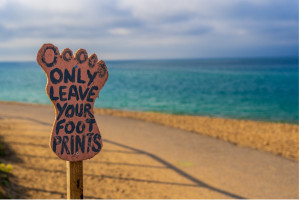 The most important thing about footprints is contained in the deep, symbolic meaning of the valuable memories we leave behind – our footprints in the sands of time. Do we really know, in this moment, what they may be?
The most important thing about footprints is contained in the deep, symbolic meaning of the valuable memories we leave behind – our footprints in the sands of time. Do we really know, in this moment, what they may be?
There are important questions we can ask ourselves before it’s too late to make changes if we aren’t currently living up to our own expectations. For example, what have I contributed to life so far? Do I feel proud of the use I have made of the physical, emotional, intellectual and spiritual assets I was born with, or the assets I have acquired through effort or good fortune? Have I made excuses for failing to achieve my potential?
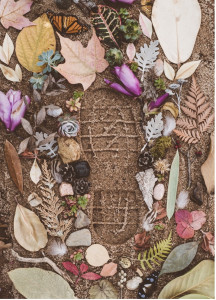 If we were writing our own obituary, how would we describe the footsteps we have left in the sands of time? What would our children grieve? Our parents? Our partners? Our friends and colleagues? Would we be able to say, truthfully, that we have used our intelligence for our own good and the good of the wider community? For the environment? Have we acquired wisdom? What have we done with our emotional capacity? Have we risked loving intensely; have we expressed our feelings as openly and often as we might? Have we been aware of and responsive to our own needs – physical, emotional, intellectual and spiritual – and compassionate when faced with the needs of others? Is even one tiny fraction of life as we know it, better for us having lived? Have we helped even one other soul to live their life more fully?
If we were writing our own obituary, how would we describe the footsteps we have left in the sands of time? What would our children grieve? Our parents? Our partners? Our friends and colleagues? Would we be able to say, truthfully, that we have used our intelligence for our own good and the good of the wider community? For the environment? Have we acquired wisdom? What have we done with our emotional capacity? Have we risked loving intensely; have we expressed our feelings as openly and often as we might? Have we been aware of and responsive to our own needs – physical, emotional, intellectual and spiritual – and compassionate when faced with the needs of others? Is even one tiny fraction of life as we know it, better for us having lived? Have we helped even one other soul to live their life more fully?
If grief is currently preventing us from fulfilling our potential, from leaving a footprint in life that represents our best self, or from helping our grieving children achieve their potential, the A Friend’s Place program at the National Centre for Childhood Grief might be a valuable starting point. Contact a skilled and compassionate counsellor on 1300 654 556 or write to the outreach service via [email protected]
